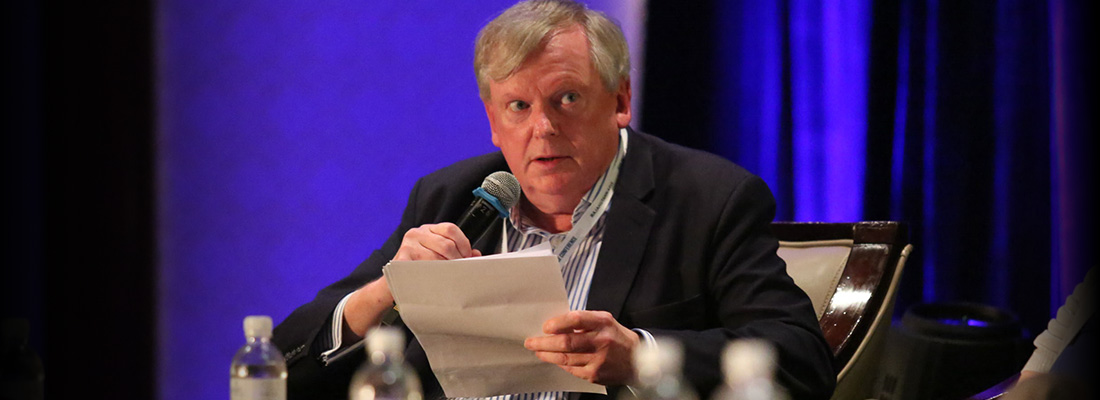
-
Contents
- Price gymnastics challenge industry
- Closing gap 'possible'
- Legal structure imported
- Ships at risk
- 'Light touch' ends
- New court eager for insurance
- Blockchain proves transparency
- Liability lags property
- Specialist courts championed
- Foreign players at risk
- 'Prepare for quakes'
- Pike River families angry
- Bad faith penalty
- FENZ levy 'unfair'
- Lit funding 'fills need'
- AILA
- NZILA
- Home

| PREVIOUS | HOME | NEXT |
Blockchain to dramatically change transactions By Kate Tilley, Editor, Resolve Blockchain technology will dramatically change insurance transactions but is often misunderstood, says David Piesse, chief risk officer at Guardtime, the world's first blockchain company. Mr Piesse told APIC17 the blockchain platform connected clients, brokers, insurers and third parties to distributed common ledgers that capture data about identities, risk and exposures; and integrate the information with insurance contracts. He defined blockchain as "a way connected computers or devices reach agreement (consensus) across a shared decentralised data source they use to perform their business. It provides transparency and auditability for all stakeholders involved to establish decentralised trust and verify (truth) between parties so they do not have to trust each other. There are no humans involved in the computational process and no one entity owns or controls it." The blockchain platform can:
In an interview with Resolve, Mr Piesse said blockchain was about identity, data ownership and integrity, not primarily cryptocurrencies. "It will get customers closer to insurers, reduce errors and omissions, streamline processes to reduce expenses, and improve claims management so insurers' combined ratios improve." Blocks of data are chained to others, creating "an immutable audit trail". Ledgers maintain the transaction data and sensitive data is stored off ledger. "We know the provenance of data collected, aggregated and disseminated, and can ensure it hasn't been tampered with." Mr Piesse said there was a lot of hype about blockchain, but its real purpose was data integrity and protecting the data layer. It was a way to share data safely between multiple parties. "Many data integrity breaches could have been prevented if blockchain were used," he said. "Organisations must look at their ‘crown jewels data' and make sure it's protected. Encryption without integrity is not enough." Mr Piesse said blockchain was enterprise risk management for the digital world. He predicts blockchain will eventually become ubiquitous, like the internet. The time frame will depend on countries' regulatory systems, but it will help nations without strong insurance penetration to leapfrog into micro-insurance and the like. "No matter what you do online you are trusting someone to tell you the truth – whether it is your bank giving you a statement balance, your email service provider telling you your message was delivered or your anti-virus telling you all is OK. This is why internet security is such a disaster today." Blockchain moved from trust to truth. "Trust is the firm belief in the reliability or ability of someone or something. Trusting a network or the data stored in an enterprise or cloud service provider is not reliable without the basic instrumentation and metrics to develop a formal situational awareness into how reliable these assets really are and what they are doing with the data, services, and applications they are hosting," he said. "Truth can be measured – it means undeniable independent proof, which can be proven forensically in a court of law. Truth not trust is essential for any network, enterprise, or data storage asset – i's operation and interactions with the data being hosted should be able to be independently verified with forensic proof that holds up in a court of law. Organisations hosting data cannot be involved in the verification process." Mr Piesse told APIC17 blockchain had the potential to reduce the duplication in marine insurance, get claims paid in hours instead of years and premiums paid in seconds. Guardtime and a range of partners, including EY and global shipping company Møller- Maersk, have developed a world-first marine insurance blockchain platform which launches early next year. Mr Piesse said boards needed to shift their thinking to data being a boardroom not an IT responsibility. Guardtime, headquartered in Estonia, was established after that country's massive 2007 cyber attack. Its technology is used by the US Pentagon and defence forces around the globe. |
Resolve is the official publication of the Australian Insurance Law Association and
the New Zealand Insurance Law Association.

